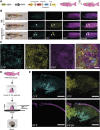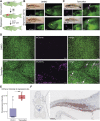Fate mapping melanoma persister cells through regression and into recurrent disease in adult zebrafish
- PMID: 35929478
- PMCID: PMC9509888
- DOI: 10.1242/dmm.049566
Fate mapping melanoma persister cells through regression and into recurrent disease in adult zebrafish
Abstract
Melanoma heterogeneity and plasticity underlie therapy resistance. Some tumour cells possess innate resistance, while others reprogramme during drug exposure and survive to form persister cells, a source of potential cancer cells for recurrent disease. Tracing individual melanoma cell populations through tumour regression and into recurrent disease remains largely unexplored, in part, because complex animal models are required for live imaging of cell populations over time. Here, we applied tamoxifen-inducible creERt2/loxP lineage tracing to a zebrafish model of MITF-dependent melanoma regression and recurrence to image and trace cell populations in vivo through disease stages. Using this strategy, we show that melanoma persister cells at the minimal residual disease site originate from the primary tumour. Next, we fate mapped rare MITF-independent persister cells and demonstrate that these cells directly contribute to progressive disease. Multiplex immunohistochemistry confirmed that MITF-independent persister cells give rise to Mitfa+ cells in recurrent disease. Taken together, our work reveals a direct contribution of persister cell populations to recurrent disease, and provides a resource for lineage-tracing methodology in adult zebrafish cancer models.
Keywords: Fate mapping; Lineage tracing; Melanoma; Persister cells; Recurrent disease; Zebrafish.
© 2022. Published by The Company of Biologists Ltd.
Conflict of interest statement
Competing interests E.E.P. is the Editor-in-Chief at Disease Models & Mechanisms but was not included in any aspect of the editorial handling of this article or peer review process.
Figures







Similar articles
-
Zebrafish MITF-Low Melanoma Subtype Models Reveal Transcriptional Subclusters and MITF-Independent Residual Disease.Cancer Res. 2019 Nov 15;79(22):5769-5784. doi: 10.1158/0008-5472.CAN-19-0037. Epub 2019 Oct 3. Cancer Res. 2019. PMID: 31582381 Free PMC article.
-
Fishful thinking: the rise and fall of MITF in melanoma.Pigment Cell Melanoma Res. 2014 Jan;27(1):7-8. doi: 10.1111/pcmr.12177. Epub 2013 Oct 23. Pigment Cell Melanoma Res. 2014. PMID: 24118901 No abstract available.
-
PPP6C, a serine-threonine phosphatase, regulates melanocyte differentiation and contributes to melanoma tumorigenesis through modulation of MITF activity.Sci Rep. 2022 Apr 2;12(1):5573. doi: 10.1038/s41598-022-08936-0. Sci Rep. 2022. PMID: 35368039 Free PMC article.
-
MITF in melanoma: mechanisms behind its expression and activity.Cell Mol Life Sci. 2015 Apr;72(7):1249-60. doi: 10.1007/s00018-014-1791-0. Epub 2014 Nov 30. Cell Mol Life Sci. 2015. PMID: 25433395 Free PMC article. Review.
-
Microphthalmia-associated transcription factor expression levels in melanoma cells contribute to cell invasion and proliferation.Exp Dermatol. 2015 Jul;24(7):481-4. doi: 10.1111/exd.12724. Exp Dermatol. 2015. PMID: 25866058 Review.
Cited by
-
Melanocyte lineage dynamics in development, growth and disease.Development. 2024 Aug 1;151(15):dev201266. doi: 10.1242/dev.201266. Epub 2024 Aug 2. Development. 2024. PMID: 39092608 Free PMC article. Review.
-
Development of a Triple-Negative Breast Cancer Leptomeningeal Disease Model in Zebrafish.Cells. 2023 Mar 24;12(7):995. doi: 10.3390/cells12070995. Cells. 2023. PMID: 37048068 Free PMC article.
-
ALDH1A3-acetaldehyde metabolism potentiates transcriptional heterogeneity in melanoma.Cell Rep. 2024 Jul 23;43(7):114406. doi: 10.1016/j.celrep.2024.114406. Epub 2024 Jul 3. Cell Rep. 2024. PMID: 38963759 Free PMC article.
-
Long-term non-invasive drug treatments in adult zebrafish that lead to melanoma drug resistance.Dis Model Mech. 2022 May 1;15(5):dmm049401. doi: 10.1242/dmm.049401. Epub 2022 May 9. Dis Model Mech. 2022. PMID: 35394030 Free PMC article.
-
Cancer drug-tolerant persister cells: from biological questions to clinical opportunities.Nat Rev Cancer. 2024 Oct;24(10):694-717. doi: 10.1038/s41568-024-00737-z. Epub 2024 Sep 2. Nat Rev Cancer. 2024. PMID: 39223250 Review.
References
Publication types
MeSH terms
Substances
Grants and funding
LinkOut - more resources
Full Text Sources
Medical
Molecular Biology Databases
Research Materials

